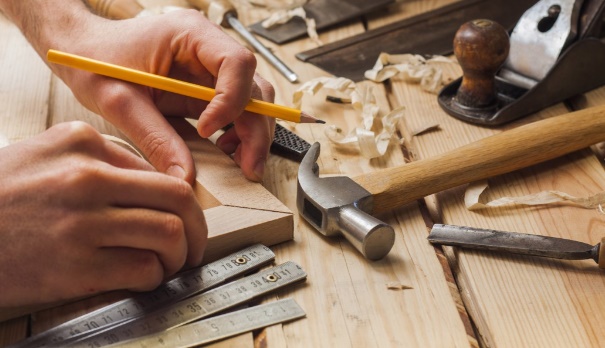
Carpentry Skills List and Examples | SkillsandTech
Carpentry Skills List and Examples
Carpenters construct and repair building structures made from wood and other materials, including door frames, stairways, and more. They also install household items such as cabinets, drywall, and siding.
Carpenters have a variety of skills. Some even specialize in particular tasks, including insulating buildings or building kitchen cabinets. There are also different types of carpenters, including residential, commercial, and industrial carpenters.
Below is a list of the top six most important skills for a carpenter, as well as a longer list of other skills employers seek in candidates for carpentry jobs.
How to Use Skills Lists
You can use these skills lists throughout your job search process. Firstly, you can use these skill words in your resume. In the description of your work history, you might want to use some of these keywords.
Secondly, you can use these in your cover letter. In the body of your letter, you can mention one or two of these skills, and give a specific example of a time when you demonstrated those skills at work.
Finally, you can use these skill words in your interview. Make sure you have at least one example for a time you demonstrated each of the top 6 skills listed here.
Of course, each job will require different skills and experiences, so make sure you read the job description carefully, and focus on the skills listed by the employer.
Also, review our lists of skills listed by job and type of skill.
Top Six Carpentry Skills
Mechanical Skills
Carpenters require mechanical skills to work with a variety of tools and machines. These might include ladders, electronic levels, and rotary tools, such as power saws. Carpenters must be comfortable operating, and occasionally repairing, these types of tools
Math Skills
Carpenters require math skills to measure materials to be cut and installed. They also require math skills to plan a project – this might include reading blueprints and making measurements, as well as calculating costs to make sure the project comes in under budget. Carpenters use arithmetic, algebra, geometry, and even calculus and statistics.
Detail Oriented
Carpenters must be very precise in their work. They have to measure distances and the size of items exactly when installing household items. An eye for detail helps with making measurements and fitting structures.
Critical Thinking Skills
Carpenters must be able to problem solve when issues arrive in a project. Often, projects run longer than expected or errors occur, such as materials arriving late or in the wrong size. Carpenters have to think critically to solve these issues. With strong critical thinking skills, carpenters can use logic to not only solve problems, but even to foresee them before they occur, and avoid them.
Physical Strength
Carpenters need physical strength to lift and wield heavy tools and materials, including lumber (which can often be quite heavy). They also need physical stamina – most jobs require standing, climbing, lifting objects, and/or bending down for long periods at a time.
Communication
Communication is a useful soft skill for a carpenter. Carpenter should be able to communicate effectively with clients. They need to listen carefully so they can understand what the client needs. They also need to be able to explain complex technical issues to their clients. Customers appreciate a carpenter who listens to their needs, and explains things clearly and kindly.
Carpenter Skills
A – G
- Appliance Installation
- Budgeting
- Building
- Building Codes
- Building Housing Additions
- Building House Foundations
- Building Plans
- Cabinet Building
- Commercial
- Communication Skills
- Computer
- Critical Thinking
- Customer Relations
- Customer Service
- Cutting
- Design
- Detail Oriented
- Drilling
- Estimates
- Finishing
- Framing
- Furniture Making
H – M
- Hand-Eye Coordination
- Hand Tools
- Insulation
- Installation
- Layout
- Maintenance
- Manual Dexterity
- Marking
- Math
- Measuring
- Mechanical Skills
N – S
- Nailing
- New Construction
- Ordering
- Ornamental Design
- Painting
- Personal Relation
- Paneling
- Physical Strength
- Planning
- Project Management
- Problem Solving
- Power Tools
- Quality Control
- Reading Blueprints
- Refinishing
- Remodeling
- Renovation
- Repairs
- Residential
- Restoration
- Rigging
- Rough to Finish
- Sales
- Sanding
- Sawing
- Scheduling
- Supervision
T – Z
- Time Management
- Trimming
- Troubleshooting
- WoodworkCarpentry Skills List and Examples





One Comment
Pingback: